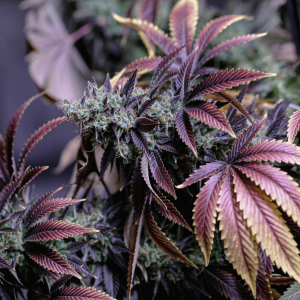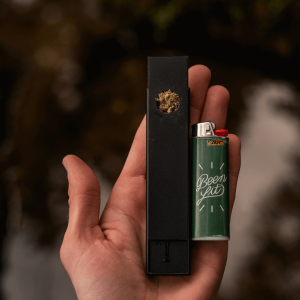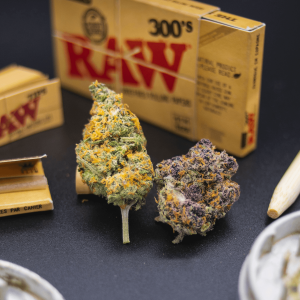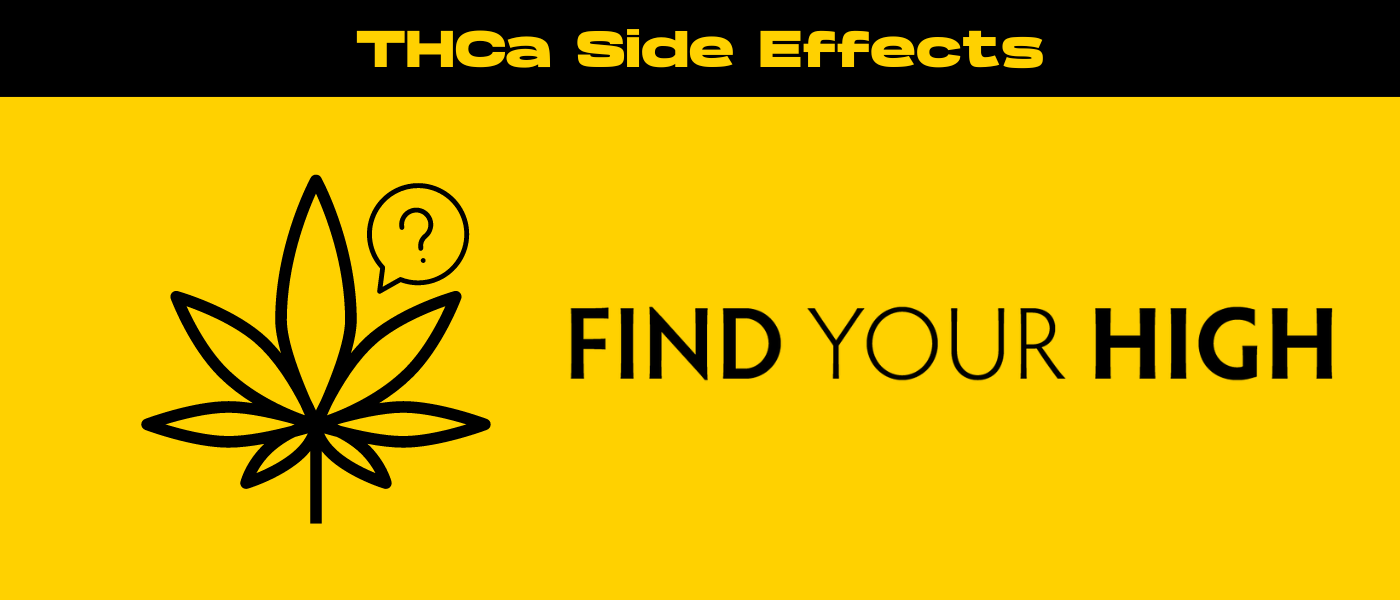THCa, or Tetrahydrocannabinolic acid, is originally found in a raw and live cannabis plant. It’s the precursor to THC, the compound most known for its psychoactive effects. When cannabis is heated, this naturally occurring cannabinoid converts to THC, delivering its well-known effects.
But before it becomes THC, THCa carries its own set of characteristics and potential side effects. Understanding these side effects is crucial, whether you’re a recreational user or considering it for medicinal purposes.
In this blog, we’ll aim to shed some light on what THCa is, the potential benefits, and most importantly, the side effects you should be aware of to make informed and safe decisions.
What is THCa?
THCa stands for Tetrahydrocannabinolic acid, a non-psychoactive compound found in the raw form of live cannabis plants.
Chemically speaking, THCa is a cannabinoid acid, meaning it has an extra carboxyl group (-COOH) compared to THC (Tetrahydrocannabinol). This additional carboxyl group changes its shape and how it interacts with the body.
THC and THCa might seem similar, but they have some key differences. While THCa is non-psychoactive, THC is well-known for its psychoactive effects, the “high” people experience. This distinction happens because THCa doesn’t bind well with the cannabinoid receptors in your brain, whereas THC does.
In its natural state, THCa is abundant in live cannabis flowers and leaves. When the cannabis plant is dried, cured, or heated, THCa converts into THC through a process called decarboxylation. Essentially, any time cannabis is smoked, vaporized, or baked into edibles, this heat-induced transformation takes place, transforming the non-psychoactive THCa into psychoactive THC.

How THCa Works in the Body
Interaction with the Endocannabinoid System
THCa flower interacts with the body’s endocannabinoid system differently than THC. While THC fits like a key into the body’s CB1 receptors, mostly found in the brain, THCa doesn’t have the same impact since it doesn’t fit well into either CB1 or CB2 receptors. However, THCa may still influence the endocannabinoid system indirectly and potentially modulate its functions.
Conversion Process to THC through Decarboxylation
The journey from THCa to THC involves decarboxylation, a chemical reaction that removes a carboxyl group and releases carbon dioxide. This process usually happens when cannabis is exposed to heat, such as smoking or cooking. It’s a vital step for those seeking the psychoactive effects of THC.
Potential Therapeutic Properties
While research is still ongoing, preliminary studies suggest that THCa might possess its own set of therapeutic properties. It has been looked at for potential anti-inflammatory, neuroprotective, and anti-emetic effects. Although it doesn’t get you high compared to other cannabinoids, these properties make THCa an interesting compound for further research and possible medical applications.
Common Side Effects of THCa
While THCa is often praised for its potential benefits, it’s essential to be aware that it may come with its own set of side effects.
Generally speaking, THCa flower is considered to be non-psychoactive, meaning it won’t give you the “high” that THC provides. However, some users report mild discomfort like dizziness, dry mouth, or slight nausea.
It’s worth noting that these side effects are generally rare and much milder compared to those experienced with THC. Unlike THC, which can cause more pronounced psychoactive effects such as paranoia, anxiety, and impaired motor skills, THCa’s side effects are typically less severe and more manageable. This makes THCa in hemp flower a gentler option for those looking to avoid the more intense effects of THC.
Understanding these differences can help you make a more informed decision when exploring cannabis-based products.

Short-term Side Effects
Drowsiness and Fatigue
One of the short-term side effects of THCa is drowsiness and fatigue. This can sometimes occur because the body is adjusting to the compound, or it may be due to THCa’s potential relaxing effects. The duration of this drowsiness varies among individuals but typically lasts only a few hours.
Causes and Duration
The primary cause of drowsiness and fatigue when using THCa could be its interaction with the body’s endocannabinoid system. This system regulates various bodily functions, including sleep patterns. If you’re new to using THCa, your body might need some time to adapt. The drowsiness usually doesn’t last long, often subsiding within a few hours as your body metabolizes the compound.
Mitigation Strategies
To mitigate these effects, it’s advisable to start with a smaller dose to see how your body reacts. Consuming THCa at a time when you don’t need to be fully alert is also a good idea. Staying hydrated and maintaining a balanced diet can also help alleviate feelings of fatigue.
Dry Mouth (Cottonmouth)
Another common side effect of THCa is dry mouth, often referred to as “cottonmouth.” This condition occurs because cannabinoids affect the production of saliva.
Explanation and Prevention Tips
Dry mouth happens when the cannabinoid receptors in your salivary glands are activated, reducing saliva production. To prevent or alleviate this, make sure to drink plenty of water before and after consuming THCa. Chewing sugar-free gum or sucking on lozenges can also stimulate saliva production and help keep your mouth moist.
Appetite Changes
THCa can also influence your appetite, either increasing or decreasing it depending on how your body reacts.
Increase or Decrease in Appetite
Some users may experience an increase in appetite, a phenomenon often referred to as “the munchies.” This is generally caused by the compound’s interaction with the endocannabinoid system, which plays a role in regulating hunger signals. Conversely, some might find their appetite decreases, though this is less common.
Blood Pressure Fluctuations
Blood pressure fluctuations are another potential short-term side effect of THCa, which might cause either high or low blood pressure in different users.
High and Low Blood Pressure Risks
THCa can potentially lower blood pressure because it may cause blood vessels to dilate. This can result in lightheadedness or dizziness, particularly when standing up quickly. Alternatively, it might also cause a temporary increase in blood pressure, especially in those already prone to hypertension.
Monitoring your blood pressure and consulting with a healthcare provider if you notice any issues is essential. Staying hydrated and avoiding sudden movements can also help manage these fluctuations.
Long-term Side Effects
Potential Cognitive Effects
When it comes to long-term use of THCa, one area of concern is its potential impact on cognitive functions, particularly memory and concentration. Although THCa is non-psychoactive, there’s still much to learn about its long-term effects on the brain. Some users report challenges in maintaining focus or experiencing memory lapses over extended periods of use.
Current research on THCa’s long-term cognitive effects remains inconclusive, as most studies focus on its more psychoactive counterpart, THC. However, some preliminary investigations suggest that while THCa may influence brain activity, its impact is less pronounced than THC.
More research is needed to fully understand how consistent use of THCa might affect cognitive functions in the long run.
Respiratory Issues (when smoked)
Smoking any substance, including THCa, can pose risks to respiratory health. While the burning of cannabis can release harmful toxins and irritants similar to smoking tobacco, the extent to which THCa alone contributes to respiratory issues isn’t fully understood.
Compared to traditional cigarette smoking, the health risks related to THCa smoking might be lower, but inhalation of combusted material always carries the risk of lung irritation and other pulmonary issues.
Alternative Consumption Methods
To sidestep respiratory issues, many users opt for alternative methods of consuming THCa. Options like vapes, edibles, and tinctures provide ways to enjoy THCa without inhaling smoke. Using these methods can mitigate the risk of respiratory problems while still delivering the compound’s potential health benefits.
Tolerance and Dependency
Like many compounds, the long-term use of THCa carries the risk of developing tolerance. This means that over time, you may require higher doses to achieve the same effects, which could lead to increased consumption.
How Dependency Develops
While THCa is not considered addictive in the same way as THC or other substances, there is the possibility of psychological dependency. This can happen when someone uses THCa regularly over an extended period, feeling that they need it to function or relieve certain conditions.
Understanding the risks and monitoring your use can help manage potential dependency, making it crucial to maintain moderation.

Side Effects Specific to Certain Populations
Some side effects of THCa are more pronounced in specific populations, requiring tailored precautions and considerations.
Individuals with pre-existing medical conditions, pregnant or breastfeeding women, and the elderly might experience unique reactions to the compound. Understanding how THCa interacts with different groups helps in making informed decisions about its use.
Effects on Adolescents
When it comes to adolescents, THCa’s side effects may pose unique challenges. Developing brains are particularly sensitive to various compounds, and the endocannabinoid system plays a crucial role in brain maturation.
The introduction of THCa could potentially interfere with this process, leading to cognitive and developmental issues. Adolescents might experience more pronounced side effects, such as memory impairment and difficulty concentrating, compared to adults.
Given that their brains are still in a critical stage of development, the risks for adolescents can be quite different from those for fully developed adults. For instance, younger users may be more susceptible to longer-term cognitive effects and emotional disturbances.
Parents and guardians should be cautious and consult healthcare professionals before allowing adolescents to use THCa, even for medicinal purposes.
Pregnant and Breastfeeding Women
For pregnant and breastfeeding women, the risks associated with THCa are an important consideration. Potential exposure to THCa during pregnancy and lactation stages might pose risks to the developing fetus and baby.
Although concrete research is limited, some studies suggest that cannabinoids can cross the placental barrier and be excreted in breast milk, potentially affecting the newborn’s development and health.
Due to these uncertainties and potential risks, guidelines generally recommend avoiding THCa consumption during pregnancy and breastfeeding. Consulting with healthcare providers for personalized advice and exploring alternative treatments for existing conditions during these crucial stages of life is highly advisable.
Elderly Population
The elderly population may also experience an increase in sensitivity to THCa and its side effects. Age-related changes in metabolism, body composition, and other physiological factors can make older adults more susceptible to both short-term and long-term side effects. For instance, elderly users are more likely to experience heightened drowsiness or dizziness, which can increase the risk of falls and related injuries.
Medication interactions are another concern for older adults using THCa. Since many elderly individuals are often on multiple medications, the potential for adverse interactions is higher. It’s essential for elderly users to consult their healthcare providers to carefully evaluate the risks and benefits of THCa use, monitoring for any adverse reactions closely.
By understanding how THCa affects different populations, users and caregivers can make better-informed decisions, ensuring safety and efficacy while managing health conditions.
THCa in Medical Use: Side Effects
Balancing the benefits and side effects of THCa in a therapeutic setting can be tricky, but it is possible with the right approach. For starters, the potential medical advantages of THCa, such as its anti-inflammatory and neuroprotective properties, are promising for various conditions.
However, it’s crucial to monitor and manage any side effects that might arise. You might experience mild symptoms like dizziness, dry mouth, or drowsiness. Adjusting the dosage, timing, or method of consumption can often mitigate these side effects.
Consulting with healthcare professionals for personalized guidance is also a key component of safe and effective THCa therapy.
Therapeutic Doses vs Recreational Use
When it comes to THCa, the difference between therapeutic doses and recreational use is a pivotal factor. Therapeutic doses are typically lower and precisely calculated to provide medical benefits without causing significant side effects.
In contrast, recreational use often involves higher doses that can amplify both the desired effects and potential side effects.
It’s important to remember that what might be a safe and effective dose for medical purposes could be too much for recreational users, leading to increased tolerance and potential dependency. Always start low and go slow, and consult a healthcare provider to find the right balance that meets your specific needs.

How to Minimize THCa Side Effects
Start Low and Go Slow
When it comes to using THCa, the phrase “start low and go slow” is key. Begin with a small dose and gradually increase it to find the amount that works best for you.
This cautious approach helps your body adjust to the compound, reducing the likelihood of experiencing strong or uncomfortable side effects. Taking it slow lets you better understand how THCa affects you personally, making your journey safer and more enjoyable.
Hydration and Diet
Staying hydrated and maintaining a balanced diet is essential when using THCa. Drinking plenty of water helps your body process and eliminate the compound more efficiently, which can minimize side effects like dry mouth or dizziness.
Incorporating a nutritious diet ensures that your body gets the vitamins and minerals it needs to function properly, supporting overall well-being. Think of hydration and good nutrition as the foundation for any wellness regimen, including THCa use.
Consulting Medical Professionals
Getting guidance from healthcare professionals is crucial when using THCa, especially if you’re using it to manage a health condition.
Doctors and specialists can offer personalized advice tailored to your specific needs, helping you find the right dose and method of consumption. They can also monitor your progress and make adjustments as needed, ensuring that your use of THCa is both safe and effective. Never hesitate to reach out to a medical professional for advice.
Monitoring and Adjusting Usage
Keeping track of how you feel and any side effects you experience is important. Maintain a journal where you note your doses, the time you took them, and any changes in how you feel. This diary can provide valuable insights, helping you or your healthcare provider make necessary adjustments for optimal results.
Monitoring your usage allows for timely tweaks, helping you avoid potential issues and enjoy the benefits of THCa more fully.

Conclusion
In summary, understanding and managing THCa side effects involves a cautious and well-informed approach. By starting with low doses and gradually increasing them, staying hydrated, maintaining a balanced diet, consulting medical professionals, and keeping a detailed usage journal, you can optimize the benefits of THCa while minimizing potential side effects.
This holistic and mindful strategy ensures that you can safely incorporate THCa into your wellness routine, whether for therapeutic or recreational purposes. With personalized advice from healthcare providers and the convenience of cannabis delivery services, you can navigate your THCa journey effectively and enjoy its benefits with confidence.
Frequently Asked Questions
1. What does THCa do to the body?
THCa, or tetrahydrocannabinolic acid, is known for its potential therapeutic benefits. It’s a non-psychoactive cannabinoid found in raw cannabis that can turn into THC through a process called decarboxylation (usually by heating).
THCa may have anti-inflammatory, anti-emetic, and neuroprotective properties. Users often look to THCa for relief from conditions like arthritis, nausea, and neurodegenerative diseases. However, the exact effects can vary from person to person, and ongoing research aims to further understand its full range of benefits and mechanisms of action.
2. Is it safe to smoke THCa?
Generally, smoking cannabis converts THCa into THC, the psychoactive compound responsible for the “high” associated with marijuana. For those specifically seeking THCa’s benefits without psychoactive effects, smoking is not the ideal method.
Consuming raw cannabis or THCa isolates will preserve THCa’s non-psychoactive properties. Safety also depends on factors like dosage and individual health conditions, so it’s crucial to consult with a healthcare provider before using any cannabis products.
3. Is THCa sativa or indica?
THCa itself is neither sativa nor indica; rather, it is a compound found in both types of cannabis plants. Sativa and indica are terms that describe the plant’s morphology and overall effects. Sativas are typically known for their uplifting and energizing effects, while indicas are often associated with relaxation and sedation.
THCa can be present in both sativa and indica strains, so the effects you’ll feel largely depend on the overall cannabinoid and terpene profile of the specific strain you choose.
4. Will THCa consumption result in a positive drug test?
THCa itself is not typically targeted by standard drug tests, which are designed to detect THC, the psychoactive compound formed when THCa is heated. However, depending on factors like the method of consumption and your body’s metabolism, some THCa can convert to THC, which may be detected in urine, blood, or hair tests.
If you consume THCa products and are concerned about an upcoming drug test, it’s important to be aware of this potential conversion. Always consult with a healthcare provider if you have concerns about drug tests and the substances you are using.

 Rewards
Rewards




